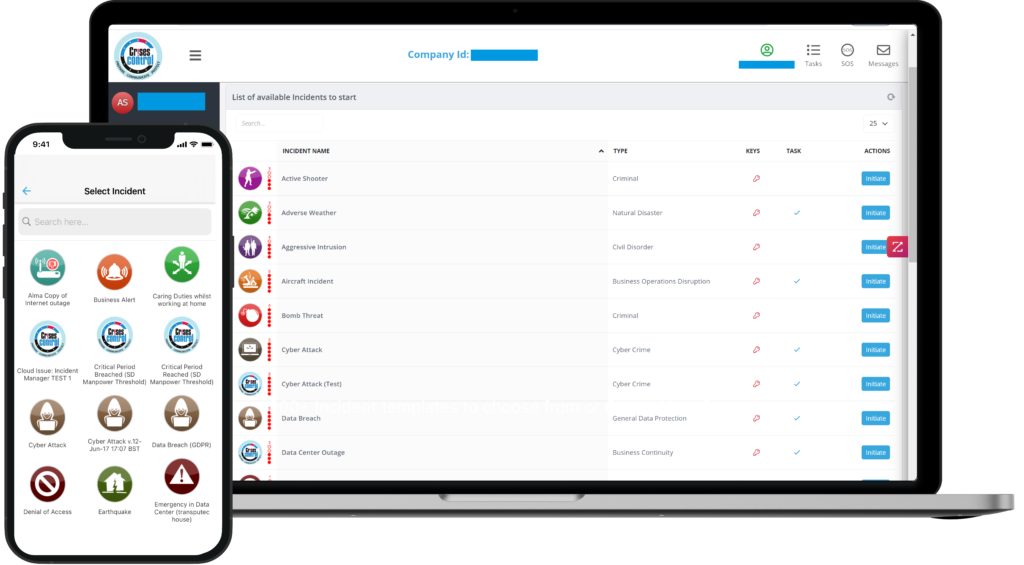Written by Shalen Sehgal | CEO
The oil and gas industry operates in a high-risk environment where even minor incidents can escalate into major crises, leading to significant financial, environmental, and human costs. Effective crisis management is crucial to mitigate these risks, and emergency alert systems play a pivotal role in safeguarding operations.
This blog delves into the importance of emergency alert systems in the oil and gas industry and highlights how Crises Control can provide robust solutions to ensure safety and operational continuity.
Understanding the High-Risk Nature of Oil and Gas Operations
The oil and gas sector is inherently fraught with hazards. From explosions and fires to spills and equipment failures, the industry faces numerous threats that can disrupt operations and endanger lives. These incidents not only pose immediate risks, but also have long-term repercussions, including regulatory penalties, legal liabilities, and damage to corporate reputation.
The Need for Robust Safety Measures
Given the high stakes, the oil and gas industry must implement stringent safety measures to prevent incidents and manage emergencies effectively. Emergency alert systems are a critical component of these safety protocols, providing real-time notifications and facilitating swift responses to mitigate potential hazards.
What are Emergency Alert Systems?
Emergency alert systems are sophisticated platforms designed to deliver real-time alerts and notifications during crises. These systems ensure that all relevant parties are informed promptly and accurately, enabling them to take appropriate action to manage and resolve the situation.
Key Components of Emergency Alert Systems
- Real-Time Notifications: Instant alerts to key personnel and stakeholders.
- Multi-Channel Alerts: Notifications delivered through various channels such as SMS, email, push notifications, and voice calls.
- Automated Response Triggers: Predefined actions initiated automatically based on the nature and severity of the incident.
How Emergency Alert Systems Work
In the oil and gas context, emergency alert systems monitor operational parameters and environmental conditions continuously. Upon detecting an anomaly or a critical incident, the system generates an alert and disseminates it to designated recipients. This ensures that response teams are mobilised immediately, and corrective measures are implemented without delay.
Key Benefits of Emergency Alert Systems in the Oil and Gas Industry
Emergency alert systems offer several advantages that enhance safety and efficiency in oil and gas operations.
Ensuring Swift Response Times
Timely response is crucial in mitigating the impact of emergencies. Emergency alert systems provide real-time alerts, ensuring that response teams are notified instantly. This reduces the time lag between incident detection and action, minimising the potential damage.
Example: Preventing Escalation
Consider a scenario where a gas leak is detected in an offshore drilling platform. The emergency alert system immediately notifies the on-site and off-site response teams, enabling them to take swift action to contain the leak and prevent an explosion. This prompt response can save lives and prevent significant environmental damage.
Minimising Risks
Emergency alert systems help in assessing and managing risks effectively. By providing accurate and timely information, these systems enable decision-makers to evaluate the situation and implement appropriate risk mitigation measures.
Reducing Downtime and Operational Disruption
In the event of an incident, the primary goal is to restore normal operations as quickly as possible. Emergency alert systems facilitate rapid communication and coordination, reducing downtime and ensuring that operations resume with minimal disruption.
Enhancing Communication
Clear and concise communication is vital during emergencies. Multi-channel alert systems ensure that all relevant parties receive critical information simultaneously, reducing the likelihood of miscommunication and ensuring a coordinated response.
Multi-Channel Notifications
By delivering alerts through multiple channels such as SMS, email, and push notifications, emergency alert systems ensure that messages reach recipients regardless of their location or device preference. This redundancy enhances the reliability of communication during crises.
How Crises Control Can Help
Crises Control is a leading provider of emergency management solutions, offering state-of-the-art emergency alert systems tailored to the oil and gas industry. Our platform is designed to enhance safety, improve communication, and ensure operational continuity during crises.
At Crises Control, we understand the unique challenges faced by the oil and gas industry. Our emergency alert systems are equipped with advanced features that address these challenges, ensuring that your operations remain safe and resilient.
Features and Capabilities
- Real-Time Alerts: Receive instant notifications of critical incidents, enabling immediate action.
- Multi-Channel Notifications: Ensure that alerts reach all relevant parties through SMS, email, push notifications, and voice calls.
- Automated Response Triggers: Implement predefined actions automatically based on the nature and severity of the incident.
- Integration with Existing Systems: Seamlessly integrate our emergency alert system with your existing safety and operational protocols.
Benefits for Oil and Gas Operations
Crises Control’s emergency alert system offers numerous benefits for oil and gas operations:
- Swift Response Times: Our real-time alerts ensure that response teams are mobilised instantly, reducing the impact of emergencies.
- Risk Minimisation: Accurate and timely information helps in assessing and managing risks effectively.
- Enhanced Communication: Multi-channel notifications ensure clear and concise communication during crises.
- Operational Continuity: Our system facilitates rapid communication and coordination, minimising downtime and ensuring that operations resume with minimal disruption.

Interested in our Incident Management Software?
Customise your Crisis Incident Management Software to meet your specific needs with our flexible tools & stay connected and informed during the crisis and incident management process
Client Success Stories
Our clients in the oil and gas industry have experienced significant benefits from implementing Crises Control’s emergency alert system. One such success story comes from a major oil and gas company in Europe, highlighting the real-world impact and effectiveness of our solution.
Case Study: Enhancing Safety and Response with Crises Control
Background
A leading European oil and gas company faced significant challenges in managing critical incidents due to the complex and high-risk nature of their operations. They needed a robust and reliable emergency alert system to ensure the safety of their workforce and minimise operational disruptions.
Challenge
The company required a solution that could:
- Provide real-time notifications of critical incidents.
- Deliver alerts through multiple channels to ensure all relevant parties were informed.
- Enable swift and coordinated response actions to mitigate risks.
Solution
Crises Control provided a comprehensive emergency alert system tailored to the specific needs of the oil and gas industry. Key features of the solution included:
- Real-Time Alerts: Instant notifications were sent to key personnel upon detecting any critical incident, ensuring immediate awareness and response.
- Multi-Channel Notifications: Alerts were delivered through SMS, email, push notifications, and voice calls, guaranteeing that all stakeholders received timely information.
- Automated Response Triggers: Predefined actions were automatically initiated based on the incident type and severity, streamlining the response process.
Implementation
The implementation process involved:
- Integration with Existing Systems: The Crises Control platform was seamlessly integrated with the company’s existing safety and operational protocols, ensuring a smooth transition.
- Training and Support: Comprehensive training sessions were conducted for the company’s staff to familiarise them with the system’s features and functionalities. Ongoing support was provided to address any queries or issues.
Results
The implementation of Crises Control’s emergency alert system led to significant improvements in the company’s crisis management capabilities:
- Enhanced Safety: Real-time alerts and automated response triggers ensured that critical incidents were addressed promptly, reducing the risk of escalation and enhancing overall safety.
- Improved Communication: Multi-channel notifications facilitated clear and concise communication during emergencies, ensuring that all relevant parties were informed and coordinated.
- Operational Continuity: The swift and coordinated response actions minimised downtime and operational disruptions, enabling the company to maintain continuity in their operations.
Client Testimonial
“Crises Control has provided an additional level of assurance to us that our critical messages will get out quickly and securely when they are needed.” – Head of Business Continuity, Leading Oil & Gas Industry
Conclusion
The oil and gas industry operates in a high-risk environment where effective crisis management is essential. Emergency alert systems play a crucial role in safeguarding operations, ensuring swift responses, and minimising risks. Crises Control offers advanced emergency alert systems tailored to the unique needs of the oil and gas sector, providing real-time alerts, multi-channel notifications, and automated response triggers.
Contact us today to get a free personalised demo and see how Crises Control can enhance the safety and resilience of your operations.
Request a FREE Demo

